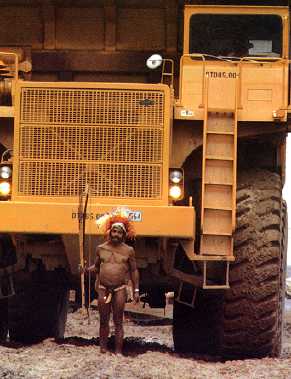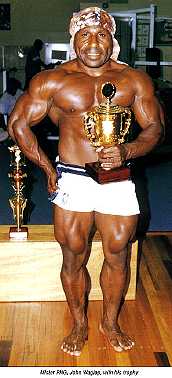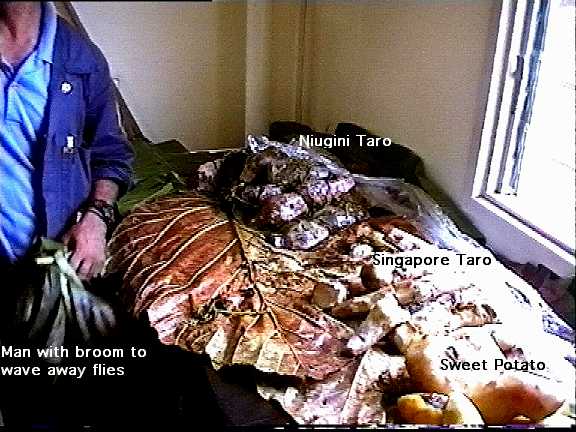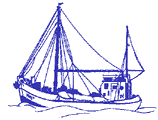Social and Economic Development
Change of the Way of Life
The life of a Min was threatened by disease, war, and accident, so life
expectancy was just 30 years, and infant mortality 30%, before modern techniques,
health care, pacification, and transport facilities were introduced.
Many in the Ok Tedi valley saw the mine as the chance, to close up
to standards of modern civilisation. The Min were boosted from a very poor
standard of material living to wages and compensation payments considerably
above PNG standards. That allowed them to afford new housing and commodities
of modern life. Tabubil's population raised from 500 to 10,000. Infant
mortality is at 3%, life expectancy well above 50 years. Not all improvements,
however, are merit of the mine, as OTML and its lobbyists like Sir Ebia
Olevale (whom we met at Port Moresby) like to claim. PNG made progress
in other parts of the country without mining.
 
Even a Min warrior in full arms and bilas looks like a dwarf in front of
a 190 t mining truck on a picture taken 1983 (Foto Ok Tedi 24:00). John
Waglep, working with a contractor of OTML at Tabubil, won the title of
"Mr. PNG" in 2000 (Foto Tok Tedi, OTML Journal, July 2000). Both pictures
published by OTML, demonstrate the kind of progress, OTML claims as its
achievement.
OTML preferably recruited and trained working force from the region, i.e.
Western Province. The management, however, is formed mainly by Australians.
Landowners on the lease areas were compensated financially.
Women in general lost social status, because they were not included
to paid work like men. Men have gained more liberty, status, and control
of life, than women, simply because they have money and command, how to
spend it. In the former society of subsistence, women were inferior either,
but a man who did not comply with his chores, was not much respected in
his village community, which he could not escape.
Building a Local Economy
Services, that normally are provided by state, come from OTML. The company's
health service takes care of all people in the region, much of school and
education is sponsored by the mine, even police duties are executed by
OTML's security staff, who were appointed reserve constables.
Business at Tabubil, Kiunga, and the rest of the area along the supply
line of the mine, emerged mainly as satellites to mining. With few exemptions,
it cannot exist without the mine. OTML started programs, that give incentives
to save money, to invest it to a business. These businesses are prompted
to grow food for the local supply, or cash crops, or to attract tourism.
Some approaches of OTML's rural and economic development program seem
quite promising, because they start at the experience and tradition of
people. At Finalbin, a village close to the mine, improved breeding of
pig, poultry, rabbits, and taro is tried out, to create a broader base
of food. Traditional gardening would not supply half the number of present
inhabitants around Tabubil, which are expected to stay, when the more mobile
part of the work force has left the valley after mine closure.

A German hightechturbo pig is bigger, with a better meat/living weight
relation, but it would not survive the climate on Newguinea. At Finalbin
experiments are carried out, to breed more effective races from the local
one and from other parts of the country.

The best way to prepare food grown on Newguinea, is the Newguinean earth
oven "mumu". The picture cannot cover the table at its whole length, where
greens, chicken, rabbit, and duck were served. Singapore taro and sweet
potato proove, that Newguineans like to add foreign fruit to their diet.
How
food is grown and cooked - videoclip
In contrast, at the Bige dredge deposit, the engineers try to persuade
locals, to plant cash crop like banana and pineapple on the slopes of the
deposit, to fix the slope. When asked, locals told us, that this is not
the proper way of gardening.
At Obo, at the junction of Strickland and Fly River, the Obo Fishing
Venture tries to draw benefit from the rich resource of fish, namely barramundi
and prawn. Assisted by OTML, the cooperative was reformed in 1999 from
the relicts of an earlier attempt. Barramundi and prawn are delicious treats
- we tried that - but it is not clear, and objective of a study to be done,
if fish stock will allow a sustainable catch under the continuing impact
of tailings!
The region has a great potential for eco-tourism. The landscape in the
mountains is spectacular, birds, insects, and other wildlife is abundant
(look, that beasts!). Since many
residents at Tabubil built new houses, this may be used for bed&breakfast
accommodation. In Europe and North America, many ornithologists spend considerable
money to travel to bird watching sites. There is, however, just one project
at Kiunga, hosting 100 guests/year.
Develop the Post-Mine Economy
The first independent government saw mining projects as isolated places
in the country, that would yield enough money to improve life of all citizens.
Once the whole country were developed better, people of mining areas would
easily find another way of living, when mining finished. This concept did
not reach its goals. Ok Tedi mine suffered from technical difficulties,
and from the ups and downs of the world market, that cut the profit and
payments to the state. Though the Western Province received more money
from OTML and central government than other provinces, it was developed
least. Any politician and administrator seemed to have enriched himself
and his wantoks, so in the year 2000 state government finally sacked the
provincial government because of bad governance. Only around the mine,
wealth came upon the people. After closure of the mine, these people will
slip into a society, that is not in general progress. Much help from state
is not expected, since state is experienced as weak, and even corrupted.
Mining cannot sustain locally. Once a mine is exhausted, mining will
move, wherever a new deposit will be discovered. Most Ok Tedi residents
could not recognize, that the golden (and copper) age would last less than
one generation of man. OTML did not prepare people to that from the start.
A pronounced development strategy aiming beyond mine closure was started
in 1998. On our visit, OTML raised the impression to be more a development
agency but a mining company. This cannot disguise, that the prime objective
for OTML's shareholders is profit, and if there is no sufficient profit,
there will be no funding of development projects (see
the OTML balance sheets). To achieve a sustainable economy and social
structure, first of all a sustainable funding is necessary. It has to be
independent of shareholders, it has to be secured from bad governance and
selfish landowners, it has to be laid out transparently, and it has to
be controlled by true and cooperating representatives from the affected
region. The mine closure plan does not offer exact proposals, how to manage
this crucial problem.
BHP's exit
In 2002, BHP chose to exit the Ok Tedi mine by handing over its 52 percent
equity of OTML to a newly established "PNG Sustainable Development Program
Ltd.", based in Singapore. Of course, this happened with the consent of
PNG government. The actual value of the assets of the mine, or possible
obligations remaining from loans, are neither published by BHP nor OTML
nor government. The OTML-management, formerly appointed by BHP, remained
in office, and keeps control of mine operations. The mining law was amended,
to allow the management to set environmental standards at their own will.
Villagers in the Ok Tedi Region were urged to sign "Mine Continuation Agreements",
which were declared valid, if only one member of a village signed, with
or without consent of his neighbours. An Ok Tedi Development Foundation
(OTDF) was established, that shall take over the OTML community activities.
OTDF is managed completely by OTML till 2007, it shall be funded from profits
of the trust company in Singapore. The trust will build a reserve for the
cost of mine closure. Leaving financial data obscure (see
the OTML balance sheets), it seems, that BHP finished its Ok Tedi engagement
with hush money for PNG government members and their wantoks. Under this
condition, the development of a viable post-mining-economy in the Western
Province is at risk.
Original issue April 2001
last update February 2003
 Index
of Ok Tedi pages Index
of Ok Tedi pages
 back
to Homepage back
to Homepage
|







 rettet-die-elbe.de
rettet-die-elbe.de
